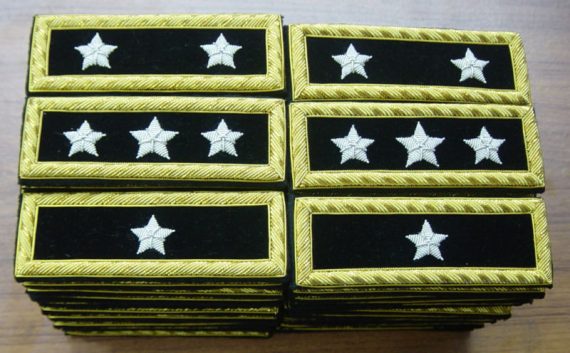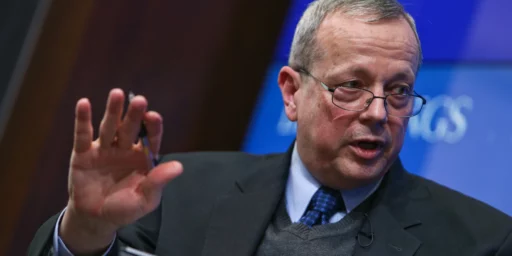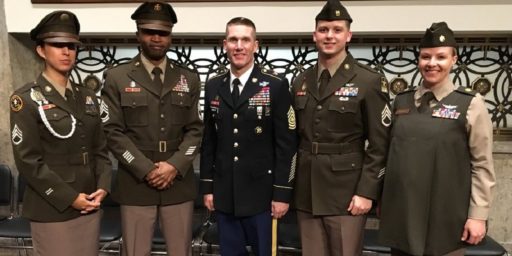Retired Generals Should Stay Out of Politics
My latest for War on the Rocks.
My latest forWar on The Rocks, “Generals and Political Interventions in American History,” has posted. It was sparked by recent party convention speeches by recently-retired generals Mike Flynn and John Allen.
There are few general officers, active or retired, whose judgment on national security matters I respect more than John Allen’s. While there are things in his convention speech with which I disagree, I share his assessment that Hillary Clinton is more fit to serve as commander-in-chief than Donald Trump (granted, a low bar).
But Allen didn’t simply present himself as a seasoned policy hand. His very first words in his convention speech were,
My fellow Americans, I stand with you tonight as a retired four-star general of the United States Marine Corps, and I am joined bymy fellow generals and admirals, and with these magnificent young veterans of Iraq and Afghanistan” [emphasis mine].
He thus wrapped himself not only in his own substantial personal credibility but in that of his profession.
That continued after the speech. Trump, as is his wont, counterpunched, calling Allen “a failed general.” In response, Allen invoked the prestige of his profession, retorting, “He has no credibility to criticize me or my record or anything I have done.” He continued, “If he’d spent a minute in the deserts of Afghanistan or in the deserts of Iraq, I might listen to what he has to say.” Worse yet, he termed Trump’s comments “a direct insult to every single man and woman who’s wearing the uniform today.”
Now, Trump’s assertion that Allen is a “failed general” because we haven’t defeated the Islamic State is at best simplistic and arguably absurd. But, having joined the political fray in such a full-throated way, Allen is fair game. Hiding behind the armor of the uniform he proudly wore and the troops who now serve is highly problematic for the institution, which holds such high prestige and has such tremendous value in our system of government precisely because it is viewed as a loyal servant of the nation rather than a partisan tool.
Further, it makes Allen’s warnings that electing Trump could result in “a civil military crisis, the like of which we’ve not seen in this country,” especially ominous. He was, rightly, pointing out the moral dilemma that would face the uniformed leadership were Trump to assume office and actually try and enact some of the off-the-cuff musings on international relations as policy. Were Trump to assume the mantle of commander-in-chief and issue an order the brass believed unlawful, they would have a duty to advise him accordingly and to abide by the laws of this nation and the laws of war. There are appropriate venues for airing that discussion, such as a Congressional hearing. A national political convention is not one of them. But, in context of a retired general who has just spoken as a party convention, it comes across as a warning that the military would be disloyal if a president of the wrong party were elected. This could lead to a calamitous state of affairs.
Meanwhile, Flynn not only spoke at the Republican convention but was purportedly on the short list to be Trump’s running mate. Even though he was not selected for the ticket, he has taken on an attack dog role, even carrying the fight to Twitter where, in what one hopes was a newbie’s incompetence, he enthusiastically retweeted an anti-Semitic attack on Clinton. That is, to say the least, not a good look.
There’s much more at the link–the piece is over 2000 words–including a tentative stab at proposing some correctives.







I haven’t clicked over to the main article yet but this discussion does have some interesting roots in American history. It was, of course, not uncommon for a time for Generals to become political actors after they left office — William Henry Harrison, Andrew Jackson, Zachary Taylor, and U.S. Grant all come to mind. Washington as well I suppose but he was something of an exception just because he was the first President. And Ike virtually had to be dragged into the political world after retiring at the end of World War II.
On a somewhat more nefarious level, of course, lie Generals such as George McClellan, who was openly contemptuous of his Commander In Chief even while wearing the uniform and then ran against him in the middle of a Civil War on a platform that was arguably sympathetic to the enemy, and, of course, Douglas MacArthur, who was political even while he was in uniform but decided to forgo a political career. Curtis LeMay also comes to mind in this regard.
Given that history, I’m not sure how to judge people like Allen and Flynn or, for that matter Colin Powell who has not been shy about speaking about political issues since retiring.
I see it differently. It is precisely because a president Trump poses such a threat to the institution of the military that Allen should speak out. After all Trump specifically calls for the re-institution of torture as a method of interrogation. Should the military obey Trump’s lawful order, or disobey, citing another, higher authority?
It is to forestall such a crisis that the General is urging the election of a President that would not give such an order. I think it is proper that he should do so.
@Doug Mataconis: Yes, I talk about that in the piece. Running for office is a clean break from the profession of arms; you become by definition a partisan at that point.
@stonetools: As I note in the piece, I would have zero problem with and would indeed applaud Allen speaking out about Trump’s position on torture. That’s of a different piece than using the prestige of his title to endorse Clinton.
James:
Read the piece while sitting in a restaurant in Bastogne. (For military atmosphere.)
One of the most important things about American history is what never happened: the US military has never left barracks to intervene actively in politics. Zero military coups in 200 plus years.
I agree entirely with your piece.
It should be noted that the only time a Commander in Chief of the Army and Navy of the United States, and of the Militia of the several States resigned in 1974
not one member of the United States military followed him in support.
While I agree a great deal, I just have one quibble: Allen was saying Trump was unfit, not the Republican Party. Unless you believe that attacks on Trump are attacks on the Republican party as a whole, that doesn’t make sense.
Also, Colin Powell is a glaring omission from this piece. What are your thoughts on his political career?
Any lesson to learn from German history? Their military leaders did not speak up, and Hitler assumed power. The military leaders were then condemned for not following their conscience.
@James Joyner:
Yeah, but the point is that a President Trump explicitly promises to re-institute torture( and other practices that violate the Geneva Convention and the military code of conduct). Would a President Trump listen to Allen speaking out against torture? Nope. He would just mock Allen as being a “loser” and carry on instituting the torture regime. Commanders who refused to go along would just be fired. And the military would be faced with the option of considering mutiny.
General Allen , by endorsing Clinton explicitly, is pushing for an executive that won’t bring the military to such a dilemma.
Think about Eisenhower. That worked out. It was a dangerous time – a huge conflict with Russia seemed all but certain. Ike was tough, but cool. It did not hurt to have the reputation of “the man who won D Day”, ” the hero of World War II”.
Ike spent more time on the golf course than any other president. That was his office.
@Lit3Bolt:
Colin Powell also served as Secretary of State. So when he opines on political matters, it’s not as someone who had a career that was purely military.
Let me somewhat challenge what seems to me to be the underlying assumption you are operating under. You seem to be stating that we should be affording military leaders a respect and honor on matters outside their military expertise and that your objection to their being involved in politics after their retirement is because it places this deemed or granted respect in jeopardy.
Why do you want to grant – and burden – general officers with a different standard for post-career activities than other non-military leaders? That is, why should we be opposed to military leaders, after their career is over, from commenting on political issues but supportive of business leaders doing so? Was Warren Buffet out of line? Or any of the physician leaders (another profession we expect not to be influenced by partisan politics while performing their professional duties)?
The military is, and should be, an honored profession and career. But it is a profession and a career. It is not some other class of people separate from the population at large. That thinking is, IMO, dangerous and un-American.
I wonder how much of this current thinking is a result of the changes we have seen in who serves. In years past, when political activity was more commonplace and expected, we had a draft and major wars were everyone served or closely knew people who served.
@SKI:
As someone whose served with and have sat in rooms with gentlemen of this rank (all gentlemen by the way), this can not be stressed enough.
In considering the two cases of Gen Allen and Gen Flynn it might be worthwhile to reflect the one draws a paycheck from RT (formerly Russian Television) and one does not.
@JohnMcC:..(formerly Russian Television)
Per WikiP RT was originally Russia Today.
(Second attempt at post. Spam filter snagged this with WikiP link.)
@SKI:
That is, why should we be opposed to military leaders, after their career is over, from commenting on political issues but supportive of business leaders doing so? Was Warren Buffet out of line?
Because Warren Buffett does not now, nor has he ever, commanded large numbers of guys with guns and tanks. There is a very, very long history of generals seizing control of government. Just start with Julius Caesar and work forward. Whereas in better than two centuries it hasn’t happened here.
A disgruntled ex-general, let’s say General Petraeus, (just a handy exemplar, not suggesting this is is at all his style) who dabbles in politics and has the strong loyalty of a large number of guys with weapons, faces a temptation. “I’ll just surround the White House and the Capitol and then I’ll save the country from hippies and pot smokers!”
We want a line, a line drawn with a big, fat Sharpie, between generals (and I’d argue Colonels) and politics. If they want to play politics I do believe there’s a different sort of politics at the Pentagon that should be almost as much fun.
It seems that some posters are condemning the class–military–and not accounting for the man, the individual, who may have an enormous background of considerable use to the nation. Certainly, some senior military men have a great knowledge of history, managing men, organizational skills, knowledge of foreign lands and peoples, the proper use of military force (usually totally lacking in our elected leaders in recent times), logistics, and leadership skills in general, plus a deep commitment to America, the Constitution, the Bill of Rights, and the rule of law.
Since perhaps the most important function of the president is conduct of our foreign relations and keeping us safe from adversaries, several of these men also had extensive experience in Europe, which to me totally outshines our candidates of today. I feel certain that such men can be found in the military even now, and could serve as president exceptionally well after their retirement.
I submit that neither is fit to serve as president for widely different reasons: Trump borders on incoherence and is given to childish retorts, acts un-presidential, while proposing some acceptable directions, but a number of absolutely mad directions.
Clinton, on the other hand, has fully demonstrated her unreliability with the nation’s secrets; a jumble of lies over decades that are embarrassing and distressing; a direction that mimics Obama; has a lack of substance in her history; a further step to the Left; haa a lust for power and money that is off-putting; and has an abrasive, two-faced personality.
The choice is totally unsavory, and does not do our nation credit that such a degrading choice would ever come about. It is an unhappy dilemma.